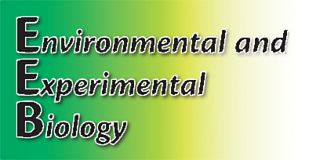
On-line: ISSN 2255–9582

| Faculty of Biology, University of Latvia | ||||||

|
Hard copy: ISSN 1691–8088
On-line: ISSN 2255–9582 Env Exp Biol (2012) 10: 99–105
|
|||||

|
About the Journal | Retractions | Open Access | Author Guidlines | Current Issue | Archive |
|
Environmental and Experimental Biology |
Env Exp Biol (2012) 10: 99–105 |
The aim of the present paper was to describe nonenzymatic ethylene formation in disintegrated plant tissues. A variety of plant samples released ethylene in unphysiological conditions during incubation in hot alkali. The release of ethylene from intact pine needles and from pine needle homogenate was oxygen- and pH-dependent. Ethylene release during hydrolysis increased with incubation temperature both in acidic and alkalic conditions. The biosynthetic precursor of ethylene, 1-aminocyclopropane-1-carboxylic acid, at physiological concentrations released only a minor amount of ethylene during hydrolysis. Exogenous 1-aminocyclopropane-1-carboxylic acid inhibited ethylene release from disintegrated tissues of different plants. Ethylene release was significantly promoted by the presence of Fe2+ and Cu2+ in incubation medium. Incubation of pine needles with hydrogen peroxide stimulated ethylene release during subsequent hydrolysis at the level of protein synthesis. The presented results suggest that plant tissues contain several substances that may contribute to ethylene production in severely stressed partially disintegrated plant tissues.